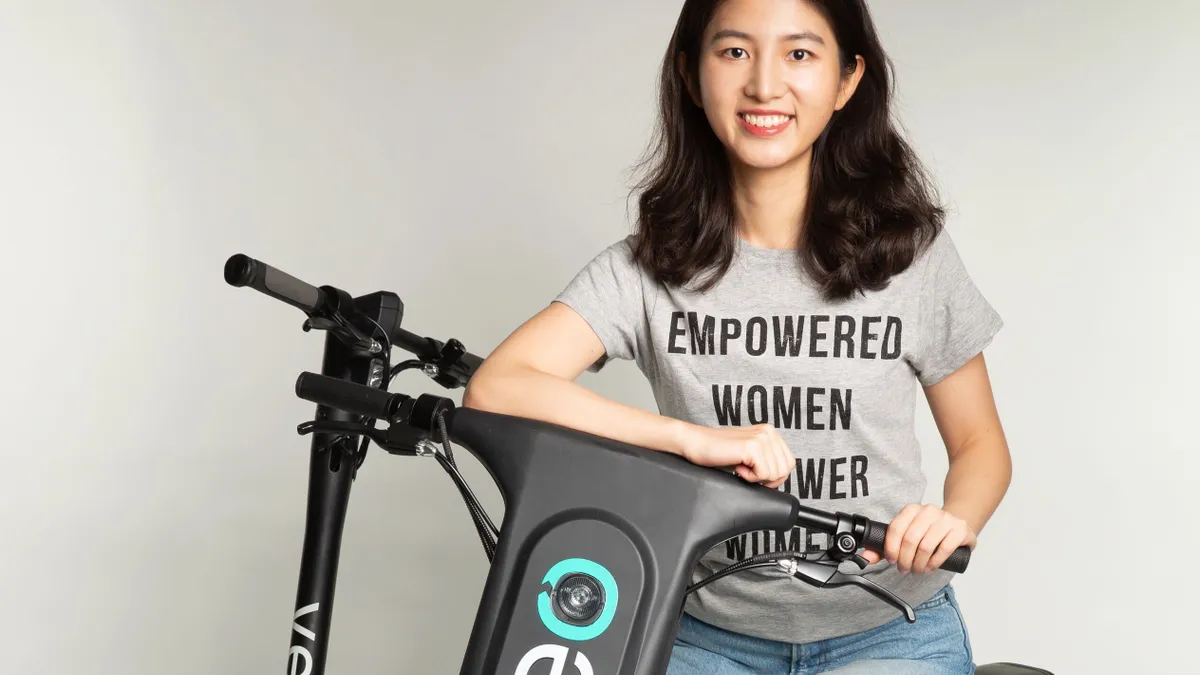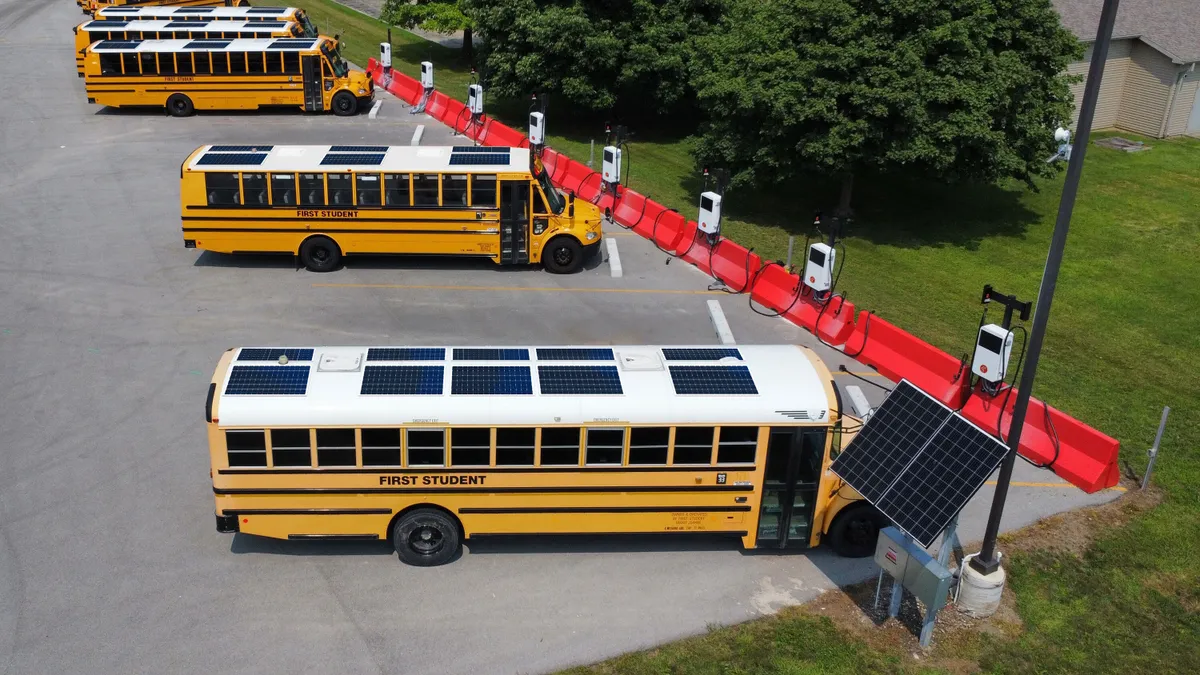An "anti-tech bro" leader is emerging in the scooter world, and she's hoping to give her male micromobility counterparts a run for their money.
Candice Xie is the co-founder and CEO of Veo, a manufacturer and operator of both standing and seated e-scooters across more than 40 markets. Xie is the only woman CEO of a major e-scooter company today, yet she's not afraid to take a seat at the table — and dish a hot take to her competitors.
In a quick-witted Medium post in December, Xie responded to Lime's November announcement of profitability with an unexpected newsflash: "Veo was the first truly profitable micromobility company — and we have been since May."
"I must have forgotten to take a global victory lap for achieving the most basic fundamental of business: bringing in more money than we spend," Xie wrote in the post, alluding to Lime CEO Wayne Ting's claims that Lime was the first micromobility company to reach a cash flow-positive quarter.
So, how does Veo claim to have reached profitability? And why did Xie wait nearly a month to refute Ting's claims? Smart Cities Dive caught up with Xie for answers to these questions and more.
The following interview has been edited for clarity and brevity.
SMART CITIES DIVE: What was your initial reaction to Lime claiming it was the first micromobility company to become profitable?
CANDICE XIE: Because of how they run their business, it's always been a struggle. But especially right now after Uber went public … It's not really worth it to grow that company at all costs without considering the profitability of the business. So, I know they [face] a lot of challenges, to raise another round and sustain their valuation in order to survive.
It's not really surprising that they’re announcing, "Hey, we are profitable" in order to justify their valuation, in order to raise the number of rounds. … A lot of firms I know utilize those tricks in order to get investors' attention, so this is just something I'm not surprised by.
Ting made the profitability announcement in a Wall Street Journal event on Nov. 19, and you published your Medium post on Dec. 21. Why did you wait a month to share your response to Ting’s announcement?
XIE: You follow the industry, so you know there's a lot of bragging and bluffing. And I know a lot of my insider [peers], they don’t really take that seriously because we all know it's a PR play.
When Lime announced they're only one quarter profitable, and they didn't also justify [the EBITDA], I didn’t take it seriously because I thought people from the industry would understand to not take it very seriously. But after maybe one or two weeks, we found a lot of people outside the industry or only somewhat familiar with the industry got the wrong impression.
At that time I realized that I shouldn't only focus on inside micromobility people. I should be responsible for everyone in the entrepreneurship world because people will be influenced on the approach that so-called successful companies claim. So that's why I didn't respond right away. I was more reserved at the impact, and then was like, it's my responsibility to call it out.
Your Medium post outlined a lot of what you didn't do in your mission to become profitable, but what notable steps did you take to reach profitability?
XIE: I'm the only woman founder in this micromobility industry. So that actually impacts the way we're operating business and differentiates us from our Silicon Valley bro who is promising the harvest for their investors, which is their sole purpose of running a business. Personally, I disagree with it because I find that approach very contradictory to the goals we are trying to achieve from the micromobility service side.
Our goal is providing a more sustainable lifestyle for people and reducing climate change and air pollution and congestion. But the way that Lime and Bird used to scale their business to hundreds of thousands of vehicles when they hadn’t figured out operations, is not correct. Think about it: You scale out to 100 cities wrongly and you need to fix everything. You actually spend a lot more money to do everything.
We're just fundamentally focused on the right thing that needs to be done to run a sustainable, profitable and also scalable business. For example, since day one, every vehicle we deploy is actually designed, manufactured and deployed directly by [us] because we’ve always believed the vehicle is the fundamental revenue driver. It impacts our user experience, perceptions for the industry, and also our bottom-line operational efficiency.
We were actually the first ones to roll out the swappable battery system, at the end of 2018 ... and we didn't brag about it because that is one route we always invest our money and time in, because that's key to be profitable and sustainable in the market.
What is your relationship with investors and VC funding?
XIE: I take VC funding as a commitment. It's like a marriage — you have to choose your partner correctly because it's very hard to break up. In the initial stage, especially in the past two years, our goal has been trying to figure out a solution that works well and then we can scale up, which is actually getting justified this year.
In the past, we didn’t need a lot of VC because I think they’re influenced by the hype Lime and Bird have: they want to promise the whole world. And I have seen a lot of companies that went under because of a bad VC relationship or unrealistic goal, and I don't think that’s a direction we want to go, so we take that step really slow.
"I take VC funding as a commitment. It’s like a marriage — you have to choose your partner correctly because it’s very hard to break up."

We do have a pretty good relationship with some of the great VC we have and I think that’s when you will have fun … and that's how we want to be responsible for growth. I also need to be responsible for my employees. I cannot afford to put on a Zoom call to fire one-third of my employees who actually put in a lot of effort to build the company together with us.
Why do you think women leadership is not more prevalent in the e-scooter space? How has identifying as a woman impacted your role?
XIE: Being a woman actually provides different perspectives to the business, especially into our earnings and market development strategy because I'm a person who loves to calculate the relationship and build on trust. Because I understand how uncomfortable the cities are when they’re nerve-wracked by Lime and Bird because they’ve dropped hundreds of thousands of scooters in their cities without asking for permission.
It's very easy for me to have the empathy to understand what they’re going through and build the relationship. I can play as the adult in the room in the industry.
The second thing is that right now — not only in micromobility but in tech in general — a lot of women, it's not our nature to constantly seek for recognition or advocation. So that's the reason why I reflect on myself … I want to set a good example as a female founder. Share your great work with the world and let them know you're powerful, you’re intelligent, and you’re able to lead a strong company like I do.




















